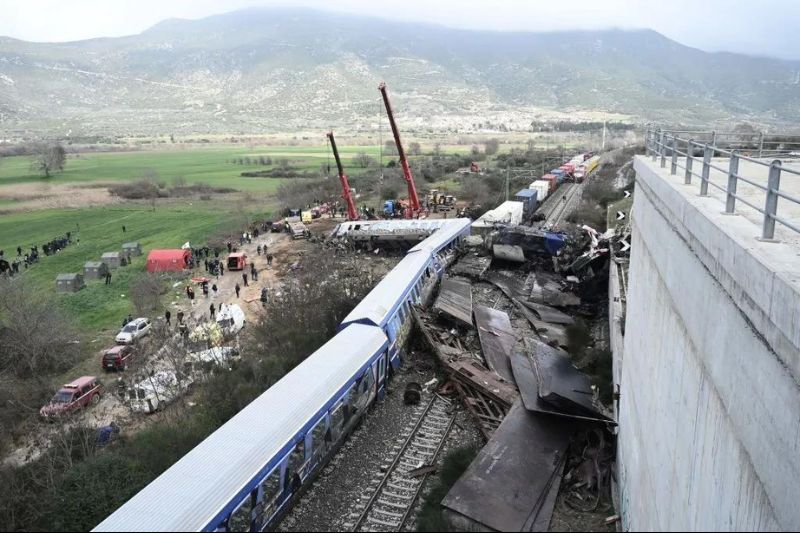Following the train collision that killed 57 people in central Greece on March 1, Turkish sports fans sent a message of solidarity to the Greek population. At the home ground of Fenerbahce, one of Turkey’s biggest soccer teams, Turkish fans raised a banner, in Greek, stating, ‘Greece, we are with you.’ This grassroots show of support came after Turkey’s President Recep Tayyip Erdogan contacted Greece’s Prime Minister Kyriakos Mitsotakis to express his sadness at the loss of life in the train crash, a tragedy that has spurred widespread protests across Greece.

The gestures by Turkish soccer fans and Erdogan mark a period of increasingly regular, positive engagement between Greece and Turkey. Greek search and rescue teams were among the first on the ground after the catastrophic earthquake that struck Turkey in early February, winning heartfelt appreciation from everyday Turks. Greek Foreign Minister Nikos Dendias was the first European politician to visit Turkey after the quake. In the stricken city of Antakya, alongside his Turkish counterpart, Dendias promised that Greece’s efforts to aid Turkey would be ongoing. Here was a repeat of the ‘earthquake diplomacy’ of 1999, when, in response to destruction caused by the Izmit earthquake, Greeks rallied to provide much-needed aid to the Turkish government and solidarity with affected Turks.
Cooperation between Greeks and Turks may seem counterintuitive. The two are sometimes portrayed as mortal enemies. Such a (mis)perception arises out of a succession of historical conflicts, from the Greek struggle for independence from the Ottoman Empire during the 1820s, to the 1912-13 Balkan Wars and the Greek campaign to claim western Asia Minor/Anatolia in the 1920s.
When the Republic of Turkey was established in 1923, Ankara and Athens agreed to a population-exchange, whereby Muslims in Greece would be transferred to Turkey and Christians in Anatolia to Greece. Undergirding the population exchanges was the conviction that peace could only be assured by the ‘unmixing‘ of the two communities, sequestering each in their own – distinct and separate – homeland. Received wisdom held that the continued cohabitation of Greeks and Turks would inevitably lead to violence.
While there is no denying episodes of violence, historian Nicholas Doumanis observes that for centuries Greeks and Turks, among other Christian, Jewish and Muslim communities, ‘accommodated each other out of habit, good will and practical necessity’ in Anatolia, the Balkans and the Levant. Doumanis calls this ‘intercommunality.’ He argues that this was the ‘way of being’ for the peoples of the Ottoman realm, a mundane truth that is overshadowed by the inter-ethnic wars and nationalist rancour that marked the empire’s collapse empire.
In Greece’s province of Western Thrace, which borders Turkey, there was no ‘unmixing.’ A population-exchange was never implemented, so Muslim and Christian populations continue to live alongside each other, largely without incident. Travelling recently through the province I witnessed in the town of Xanthi engagements that arise from the ‘habit, good will and practical necessity’ that Doumanis speaks of. Greeks and Turks alike participated in the volta, the summer evening promenade, stopping to mingle, to share tea, meals, cigarettes, gossip. In the Saturday market, stallholders called out in a Greco-Turkish pastiche, ‘Oriste, komsu’ (roughly: ‘Welcome, neighbour’), as they spruiked their fresh vegetables.
'I saw, through the windows, votive candles and Muslim namazlik (prayer mats), side by side, indication that Christian and Muslim rituals still occur here, perhaps simultaneously.'
Relations between Greece and Turkey grew dangerously tense in 2022. Turkish President Erdogan claimed Greece had illegally militarized islands in the Aegean, contravening international agreements, and that Greek jets had violated Turkish airspace. Threatening to redress such purported wrongs, Erdogan menaced, ‘We can come all of a sudden at night.’ He later appeared to make irredentist claims over Greece’s Aegean islands and Western Thrace and thundered that Turkey’s horizons cannot be restricted. Some feared an outbreak of hostilities between Greece and Turkey, both NATO members, a calamity that would have had unforeseeable consequences.
Turkish opposition leader, Kemal Kiliçdaroglu accused Erdogan and Mitsotakis of populist tactics – beating the war drum – to boost sagging popularity. Many Turks apparently agree. In a poll at the time a majority of Turks saw increased hostility towards Greece as an electoral ploy, while 64 per cent said they do not view Greeks as enemies.
On my last day in Xanthi, I ventured to the remote türbe (tomb) of Koutouklou Baba, a long-dead holy man of the Sufi Bektashi order. Historically this was a site of pilgrimage for local Muslims and Christians, but no one I asked knew of it or had visited. Although the tomb was closed, I saw, through the windows, votive candles and Muslim namazlik (prayer mats), side by side, indication that Christian and Muslim rituals still occur here, perhaps simultaneously. This seemed the very essence of ‘intercommunality,’ a place where supposedly clashing traditions come together, even if now largely unknown to locals.
Recent calamities in Turkey and Greece have put paid to sabre-rattling and fostered connections at political and grass-roots levels. It prompts me to imagine that in adversity, Greeks and Turks have recognized their shared humanity and that ‘intercommunality’ may yet re-emerge If this were to happen, it would demonstrate, from a broader perspective, that confrontation, even between purported enemies, is not inevitable, but that direct, human engagement will build a sense of kinship and common endeavour.
William Gourlay teaches international relations and Middle East politics at Monash University. He has previously worked as a teacher, editor and journalist in London, Izmir (Turkey) and his native Melbourne. He is the author of The Kurds in Erdogan's Turkey.
Main image: Police and emergency crews search wreckage after a train accident in the Tempi Valley near Larissa, Greece, March 1, 2023. The trains - one freight and the other carrying 350 passengers - collided about halfway along the route between Athens and Thessaloniki. (SAKIS MITROLIDIS/AFP via Getty Images)